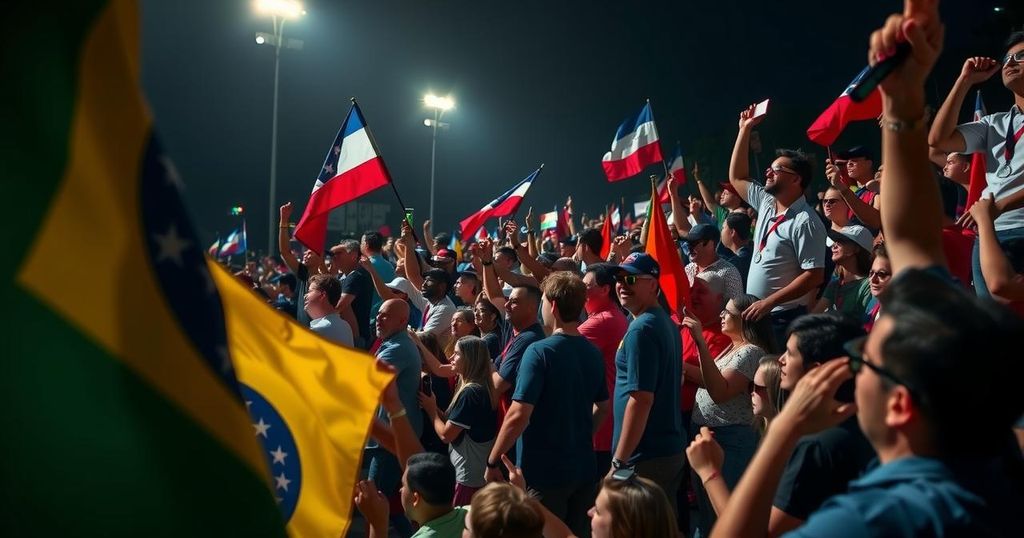Bolsonaro’s Political Aspirations: Inspired by Trump’s Resurgence in Brazil

The recent political resurgence of Donald Trump has galvanized support for Jair Bolsonaro in Brazil, with his allies looking toward the 2026 elections. Despite being barred from running, Bolsonaro draws parallels with Trump, claiming a shared narrative of electoral injustice. His son, Eduardo Bolsonaro, has forged strong ties with U.S. conservatives, establishing a base for future political endeavors in Brazil, even as they confront judicial challenges and ongoing legal investigations.
The political landscape in Brazil is reflecting the influence of the recent resurgence of U.S. politics, particularly the return of Donald Trump, which has invigorated the base of former Brazilian President Jair Bolsonaro. Acknowledged as the ‘Trump of the tropics’, Bolsonaro and his supporters view Trump’s success as a beacon for their aspirations in the upcoming 2026 elections. Although barred from running until 2030, Bolsonaro has publicly congratulated Trump, expressing his hope that Trump’s political journey would galvanize Brazilian supporters to pursue their objectives. Bolsonaro’s political trajectory closely mirrors Trump’s, marked by accusations of stolen elections, assassination attempts, and legal challenges, with the two leaders often drawing parallels in their political narratives. At a watch party in Mar-a-Lago, Donald Trump Jr. was seen alongside Eduardo Bolsonaro, highlighting the interconnectedness of their political strategies. Eduardo Bolsonaro has been instrumental in strengthening ties with U.S. conservative circles, crafting an enduring alliance that offers Bolsonaro’s movement access to American political tactics and methods. Bolsonaro’s connection with U.S. conservatives is reflected in Eduardo’s interactions with influential figures like Steve Bannon and Matt Schlapp. Bannon characterized Bolsonaro’s platform as emblematic of the Brazilian populace’s sentiments. As Eduardo expanded these ties, other Brazilian legislators also engaged with Republican figures, incorporating their strategies into Brazilian conservatism, marked by nationalism, family values, and resistance against globalism. In furthering this ideology, Eduardo co-founded CPAC Brasil, mimicking the U.S. Conservative Political Action Conference, where prominent American conservatives voiced their alignment with its themes. The effort to establish a conservative media landscape has been successful, with Brazil’s hard right echoing the U.S. model, mobilizing support while dismissing opposing media narratives as ‘fake news.’ Bolsonaro’s skepticism towards democratic institutions has further aligned him with Trump’s tactics. His campaign cast doubt on Brazil’s electoral integrity, culminating in the January 8 insurrection, which mirrored the events at the U.S. Capitol on January 6. The judiciary’s expansion of authority in reaction to these events has emboldened Bolsonaro’s narrative, positioning the Supreme Court as a political adversary rather than an impartial institution. Edging towards the next elections, Bolsonaro’s supporters are adamant in their portrayal of judicial actions as politically motivated reprisals, rallying for international oversight and seeking to overturn his disqualification from office. Despite significant legal challenges facing Bolsonaro, including ongoing investigations and restricted capabilities regarding misinformation, he continues to influence Brazilian politics. Although Bolsonaro’s aspirations to reclaim his presidency remain uncertain, his political machinery is positioned to influence the 2026 elections significantly, with his chosen successor poised to inherit substantial support and carry forward his ideological legacy. The outcome of this rivalry between the hard right and left-leaning coalition remains to be seen; however, Bolsonaro’s movement is undoubtedly energized, inspired by international counterparts.
The article examines the growing influence of American politics, specifically the impact of Donald Trump’s resurgence on Brazilian conservative politics, particularly through the lens of Jair Bolsonaro, a former president often referred to as the ‘Trump of the tropics’. It explores Bolsonaro’s strategy to mirror Trump’s tactics in political campaigning, fiscal policy, and relationship building within conservative circles in the U.S., as well as the implications of these strategies on the political climate in Brazil leading to the 2026 elections. The complex relationship between Bolsonaro’s movement and Brazil’s judiciary also reveals ongoing tensions in the pursuit of political power.
The analysis highlights Bolsonaro’s ambitious alignment with Trump’s political resurgence, reflecting shared sentiments among right-wing supporters in Brazil. Despite legal obstacles and institutional challenges that curtail his immediate political viability, Bolsonaro’s influence remains potent as he rallies his supporters for the upcoming elections. By leveraging transnational relationships with American conservatives, Bolsonaro’s movement not only seeks to cement its ideologies but also positions itself strategically for future electoral contests, embodying a continued tension between democratic norms and hard-right populism.
Original Source: www.cnn.com








